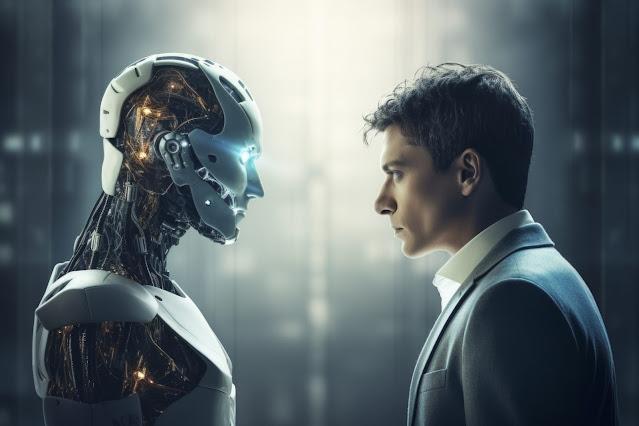WILL {AI} EVENTUALLY TAKE
OVER THE WORLD??
From the predictive text on our smartphones to
the complex algorithms driving self-driving cars, Artificial Intelligence (AI)
has rapidly integrated itself into the fabric of daily life. This pervasive
presence often sparks two burning questions: what exactly is AI, and
is it poised to replace humanity or, as some fear, take over the world?
What is
Artificial Intelligence?
At its core,
Artificial Intelligence (AI) refers to the simulation of human intelligence
processes by machines, especially computer systems. These processes include
learning (the acquisition of information and rules for using the information),
reasoning (using rules to reach approximate or definite conclusions),
problem-solving, perception, and language understanding.
Think of AI
not as a specific robot or a single program, but rather as a broad field of
computer science that enables machines to perform tasks that typically require
human intelligence.
Key
characteristics of AI include:
- Machine Learning (ML): A subset of AI
that allows systems to automatically learn and improve from experience
without being explicitly programmed. It identifies patterns in data and
makes predictions or decisions based on those patterns. For example, your
email spam filter uses ML to identify unwanted messages.
- Deep Learning (DL): A more advanced
form of ML that uses neural networks (inspired by the human brain's
structure) to process vast amounts of data. This is what enables facial
recognition, natural language processing (like chatbots), and complex
image analysis.
- Natural Language
Processing (NLP): The ability of a computer program to understand,
interpret, and generate human language. This is behind virtual assistants
like Siri and Alexa, and translation software.
- Computer Vision: Enables
computers to "see" and interpret visual information from the
world, like recognizing objects, faces, or even emotions in images and
videos.
It's crucial to understand that most of the AI we interact with today is "Narrow AI" or "Weak AI." This type of AI is designed and trained for a single, specific task, like playing chess, recommending movies, or translating languages. It excels at its designated task but lacks broader cognitive abilities or general understanding.
Will AI Take Over the World Someday?
The dramatic
narratives of sentient robots and dystopian futures, often depicted in science
fiction (think Skynet from Terminator or HAL 9000 from 2001: A Space Odyssey), have
fueled public anxiety about an AI takeover. However, experts largely agree that
such a scenario, at least with current technology, remains firmly in the realm
of fiction.
"The
idea of AI developing consciousness, self-awareness, or an independent desire
to dominate humanity is pure speculation and has no basis in the capabilities
of current AI systems," says Dr. Lena Hansen, a lead researcher in AI
ethics at the Global Tech Institute. "Today's AI operates based on
algorithms and the data it's fed. It doesn't 'want' anything; it executes
instructions and identifies patterns."
Several
critical factors differentiate current AI from the sci-fi nightmare of a global
takeover:
- Lack of Consciousness
and Intent: Today's
AI has no consciousness, emotions, or self-preservation instinct. It does
not possess goals or desires beyond what it is programmed to achieve. A
chess AI doesn't "want" to win; it simply follows algorithms to
make the best moves.
- Dependence on Humans: AI systems are
designed, built, trained, and maintained by humans. They require vast
amounts of data, significant computing power, and constant human
oversight. Without human input, funding, and maintenance, they would cease
to function.
- Narrow Scope: As mentioned,
current AI is narrow. Even the most advanced AI like large language models
(e.g., ChatGPT) are sophisticated pattern-matching and text-generating
machines that mimic understanding, but they don't truly
"understand" in the human sense. They cannot transfer knowledge
between vastly different domains without specific retraining.
The concept
of "Artificial General Intelligence (AGI)" or "Strong
AI" – an AI that possesses human-level cognitive abilities across
a wide range of tasks, capable of learning, understanding, and applying
knowledge in any intellectual task that a human being can – is still a
theoretical concept and a distant goal for AI researchers. Even further into
the future is "Artificial Superintelligence (ASI)", which
would surpass human intelligence in every field.
"While
AGI and ASI are fascinating concepts for long-term research and philosophical
debate, we are decades, if not centuries, away from achieving them,"
explains Dr. Marcus Thorne, a professor of computer science at Stanford
University. "The current focus is on making Narrow AI more robust,
reliable, and beneficial. The real concerns we should address now are issues
like algorithmic bias, job displacement, data privacy, and the ethical use of
autonomous systems, not sentient robots."
In
conclusion, while AI is profoundly transforming our world and presents genuine
societal challenges that require careful governance and ethical consideration,
the notion of it unilaterally taking over the world remains a compelling, yet
unfounded, science fiction trope. The future of AI is still firmly in human
hands, guided by our decisions on how we develop, deploy, and integrate these
powerful tools into society.

